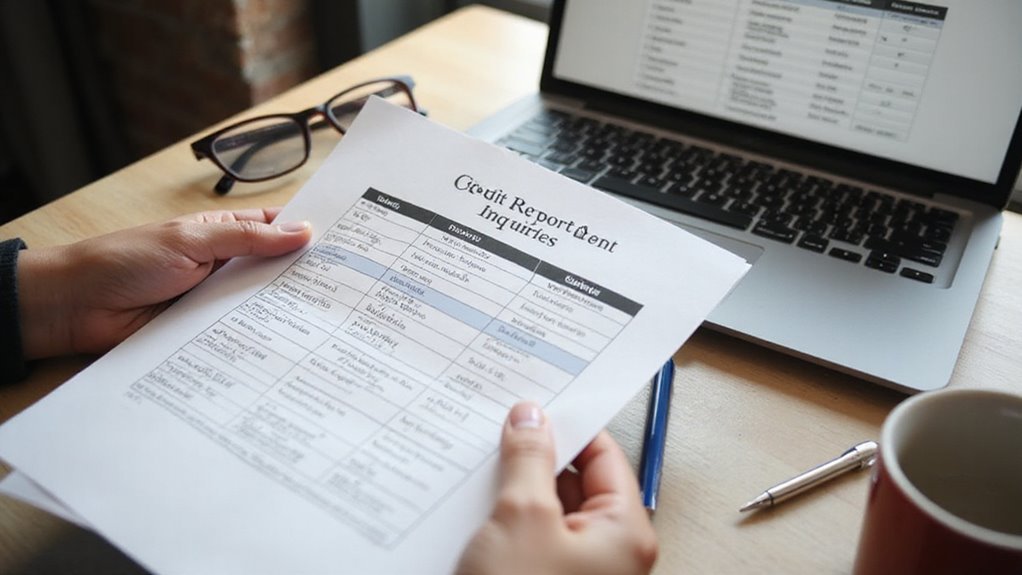


Many people don’t understand their credit report or why it matters. Mistakes can hurt your credit score and affect your future. Lenders use this report to decide if you can borrow money or get a loan. It’s important to know what’s inside your credit report.
Mistakes or unknown entries can show bigger problems. Identity theft and reporting errors happen more than you think. If you ignore your credit report, you could pay higher interest or be denied credit. It’s stressful to fix these problems after damage is done.
The good news is you can take control. To read your credit report, check each section for accuracy and spot any unfamiliar details. This helps you protect your finances and catch issues early. This blog will guide you step-by-step, so you can read your credit report with confidence and avoid costly mistakes.

A credit report is a summary of your financial history. Lenders use it when you apply for credit or a loan. Credit bureaus collect and organize this information. The report shows your personal details, credit accounts, and account balances. It also lists your payment history and recent credit inquiries. If you have bankruptcies or liens, these will appear as public records. Each section gives information about your financial habits. Reviewing your credit report can help you find mistakes. If you understand these basics, you can read your report with confidence. A strong payment history is one of the most influential factors that can affect your credit score and is reflected in your credit report. Many people also benefit from credit monitoring services to help them track changes and stay informed about their credit status.
Your credit report matters because it shows how you handle money. Lenders, landlords, and some employers check it for reliability. A good report can help you get loans, rental homes, or jobs. If your report has late payments or high debt, your credit score may fall. This can make it harder or more expensive to borrow money.
Lenders see a strong, accurate report as a sign of trust. Errors or negative marks may lead to higher interest rates or loan denials. If you watch your report, you can spot mistakes and fix them. Reviewing your report can also help you understand how your credit score tiers affect your chances for loan approval and interest rates. Understanding your report helps you protect your financial reputation. Reviewing your credit report regularly helps you catch signs of fraud early and maintain the accuracy of your financial record.

You can request your free credit report online from each major credit bureau once every 12 months. To access your report, you’ll need to confirm your eligibility and provide accurate identification details. Make sure you verify your identity carefully to protect your personal information during the process. Many services also offer real-time alerts that notify you of changes to your credit file when you access your report online. Checking your credit report regularly can help you spot errors and boost scores before applying for car financing.
You can get your free credit report online if you know where to look. Federal law lets you get one free report each year. Only AnnualCreditReport.com is approved to give these reports at no cost.
To get your report, visit AnnualCreditReport.com. Fill out the secure form with your personal details. Choose which credit agency reports you want. Follow the instructions to view your report right away.
Always use a secure internet connection to protect your information. If you have questions, check the website’s help section.
You can get a free credit report from each major credit bureau every year. Federal law gives you this right. The three main credit bureaus are Equifax, Experian, and TransUnion. If you want to check your credit, you do not need to pay or subscribe. Each bureau gives you a different report, so you should review all three. If you want, you can request reports at different times during the year. This can help you find mistakes or odd entries. Getting your free report does not lower your credit score. If you use this right every year, you can watch your credit and fix problems early.
Verifying your identity is required before you can access your free credit report. This step protects your personal information from misuse. You must give correct details so only you can view your credit report.
You will need to:
If you follow these steps, you can secure your credit report.

Your credit report identifies you with your name, addresses, Social Security number, and date of birth. It may also list phone numbers and jobs. These details match your financial data to your identity. If your information is wrong, it can cause security problems. Check that your Social Security number and other details are correct. If you find old addresses or names you do not know, dispute them. Your personal section does not show your financial details. This information forms the base of your credit report. Incorrect data can harm your credit profile. Keep your credit report safe and share it only with people you trust. Understanding your personal information is the first step to building a good credit score because it ensures that your financial record is correctly matched to you. If you notice errors, you should file a dispute online to help protect your credit health and ensure report accuracy.
Next, check each account summary to verify the status—whether it’s open, closed, or delinquent. Confirm the reported balances match your records, as errors can impact your credit score. Pay close attention to any discrepancies so you can address them quickly. Reviewing your account summaries helps you ensure that payment history, which is the largest factor in your credit score, is accurately reflected on your report. Additionally, reviewing this section helps you catch issues related to your debt-to-income ratio, which lenders may consider when you apply for new credit.
Account status shows if you are handling your credit responsibly. Each account’s status helps you understand your overall credit health. You should check these details to see how lenders might view you. If you want to know your account status, look for three main types:
If you know these statuses, you can read your credit report more easily and make better financial choices.
Account balances show exactly how much you owe on each credit account. You can find this information in the “Balance” column of your credit report. The balance includes amounts owed on credit cards and loans. If you know the terms “current balance,” “statement balance,” and “credit limit,” you can understand your credit card details. Each loan type—like an auto loan, mortgage, or student loan—has a different balance and rules. The table below shows what balance information to look for with each account type:
| Account Type | Key Balance Info |
|---|---|
| Credit Card | Current/Statement Balance |
| Auto Loan | Remaining Principal |
| Mortgage | Outstanding Principal |
| Student Loan | Current Balance Owed |

Recognizing credit inquiries means understanding who checked your credit report and why. Credit reports list every time someone looks at your credit. These checks are called inquiries. There are two main types: hard and soft inquiries. Hard inquiries happen when you apply for new credit. Soft inquiries occur when you check your own credit or for some background checks. Hard inquiries can lower your score. Soft inquiries do not affect your score. Fraud alerts can provide additional security measures if you notice unusual or unauthorized inquiries on your credit report.
If you spot an unfamiliar inquiry, you should check if it is legitimate. Look at the date and name of the inquirer for each entry. Check if the inquiry is hard or soft to see its impact. Too many hard inquiries in a short time can hurt your score. Review your credit inquiries often to catch any mistakes. It’s important to recognize that credit score ranges can be affected if there are too many hard inquiries, which may limit your lending opportunities.
Public records on your credit report show important legal actions that affect your finances. These records include bankruptcies, tax liens, and court judgments. Credit reports list them in a special section. They matter because they can lower your credit score. If a public record is wrong, it could hurt your chances for loans or jobs. For added protection, you may want to consider legal protections that help you dispute and address errors in your credit file.
For example, understanding how APR disclosure rules impact the visibility and accuracy of credit report information is essential for making informed financial decisions.
Here is how some public records appear on credit reports:
| Record Type | Information Shown | Usual Effect |
|---|---|---|
| Bankruptcy | Filing date, type | Serious, long-lasting |
| Tax Lien | Amount, paid/unpaid | High if unpaid |
| Civil Judgment | Case number, result | Moderate |
| Foreclosure | Date, property details | Major |
| Child Support | Late payment status | Depends |
You should check this section for mistakes. If you find an error, contact the credit bureau to fix it.

Now, you’ll want to watch for negative items like collection accounts, late payments, and charged-off debts. Check each account’s status and payment history to spot these red flags. Identifying them quickly lets you address potential issues before they harm your credit further. Be sure to look for missed BNPL payments as well, since some Buy Now Pay Later services report late or missed payments to credit bureaus, which can significantly lower your credit score.
Collection accounts are negative items on your credit report. These accounts show debts that were not paid and sent to collection agencies.
You can identify collection accounts by looking for unfamiliar creditor names. These agencies usually differ from your original lender.
Check if the account status says “collection,” “charged off,” or “in collections.” This status means the account was not paid.
If you see both a collection agency and an original creditor listed, the debt was transferred. This information helps you spot the source. If you find collection accounts, you should review your credit report and take steps to fix any issues.
Late payments show up as negative marks on your credit report. Look for entries labeled “30 days late,” “60 days late,” or “90+ days late.” These are usually listed in the payment history of each account. Repeated late payments can hurt your credit score even more. Even one late payment may lower your score and stay on your report for seven years. If you see any late payments, check that they are correct and belong to you. If any are wrong, you should dispute them with the credit bureau right away. This can help protect your credit and limit score damage.
Charged-off debts are serious negative marks on a credit report. A charge-off means the lender believes you will not pay the debt. This hurts your credit score for several years. If you check your credit report, look for phrases like “charged off as bad debt.” You might also see “profit and loss write-off.”
If you want to track charged-off debts, check for these details:
When you check your credit report, look for errors or missing information. Small mistakes can hurt your credit score. Check your name, address, and Social Security number for accuracy. Make sure all account balances and payment dates match your own records. Look for duplicate or unknown accounts. Incorrect late payments or wrong account statuses are common mistakes. If you see accounts you did not open, you may be a victim of identity theft. Also, confirm that any closed accounts are marked correctly. If you find any problems, contact the credit bureau right away. Careful review helps protect your credit and financial health.
If you find mistakes on your credit report, you should dispute them quickly. Errors can lower your credit score. You need to fix them to make sure your report is correct. First, gather papers like bank statements to prove the mistake. Next, send a letter to the credit bureau describing the error. Attach copies of your evidence to the letter. You should keep a record of your actions. If you do not get a reply soon, follow up with the bureau.
You can protect yourself from identity theft by checking your credit report often. Look for accounts you do not recognize and wrong addresses. Unfamiliar information could mean someone is using your identity. Review your personal and credit account details closely. If you notice anything strange, act quickly. Contact a major credit bureau to place a fraud alert on your file. This makes lenders confirm your identity before giving credit. A credit freeze gives even stronger protection if you want it. Set reminders to check your credit reports every year. If you stay alert, you can stop identity theft before it causes problems.
Improving your credit report starts with knowing what affects your credit score and how to manage debt well. Always watch for identity theft, as it protects your information and your credit report. Fix any errors on your report quickly, since mistakes can lower your score.
If you follow these steps, you can make your credit report stronger and more accurate.
You should check your credit report at least once a year from each major credit bureau. Checking your report helps you find errors and spot fraud early. Each bureau—Equifax, Experian, and TransUnion—offers one free report every year. If you want to monitor your credit more closely, request a report every four months from a different bureau. This way, you can track your credit year-round. Credit monitoring services can alert you to major changes in real time. Regular checks help you fix mistakes quickly and protect your finances. Reviewing your credit report also shows what affects your credit score. Tracking your credit helps you keep or improve your credit standing.
You’ll strengthen your understanding by turning to trusted online learning platforms, government financial education tools, and nonprofit credit counseling services. These resources offer up-to-date guidance and practical tips tailored to different credit situations. Use them to clarify complex terms, address specific concerns, and build long-term financial confidence.
Trusted online learning platforms help you learn about credit reports and financial health. These platforms offer clear, current lessons for all levels. You can use interactive modules and short videos to understand credit topics. If you want to learn, choose platforms with these features:
Government Financial Education Tools
The U.S. government gives free tools to help you learn about credit reports and scores. These resources explain how to read your credit report and spot mistakes. They also clear up common myths about credit. Use these tools to make smarter financial choices.
| Resource | Description | Website |
|---|---|---|
| CFPB Credit Reports Tool | Gives credit report basics and useful tips | consumerfinance.gov |
| MyMoney.gov | Shares advice on credit and personal finance | mymoney.gov |
| FTC Credit Education | Corrects myths and offers simple credit guidance | consumer.ftc.gov |
| USA.gov Credit Reports | Links to major credit report information | usa.gov/credit-reports |
Anyone can use these official resources to boost their credit knowledge and skills.
Nonprofit credit counseling services provide trustworthy help with your credit report. These services offer expert advice that fits your needs. If you want to improve your credit or manage debt, they can help. Counselors review your credit report and point out any errors. They explain how each part of your report affects your score. If needed, they create a payment plan to help you pay off debt. They may also talk to your creditors to get better terms. You will learn ways to budget and keep your credit healthy. Choose a nationally recognized nonprofit for dependable support.
If you regularly check your credit report, you can better protect your identity and prevent financial surprises. When you review each detail, you may catch mistakes or unauthorized accounts early. Errors can harm your credit score if left uncorrected.
If you notice any unfamiliar information, you should question it immediately. Taking quick action can help you correct errors before they affect your finances. Consistent monitoring allows you to keep your records accurate.
If you want to build a strong financial future, make credit report reviews a habit. For more tips on staying on top of your finances, download the Finance Monitoring Guide. This simple step can help you maintain control over your financial health.
Understanding what influences your credit score makes it much easier to interpret credit checks. Discover more insights and tips at the Finance Monitoring Guide.
(+1) 5165229807
info@financemonitoringguide.com
500 Marquette Ave NW, Suite 1200 Albuquerque, NM 87102 United States